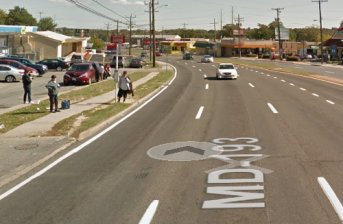Back Home in Coeur d’Alene, Where the Cars Roam Free
Pretty much everyone involved in the movement for livable streets has by now read the reports and studies about the importance of street design in pedestrian safety. But nothing can bring the point home like what happened to the writer of the Streetsblog Network blog Imagine No Cars: He was hit by a car.
First off, we are happy to tell you that he was lucky enough to escape the encounter with only a bruise to his leg. Here’s what happened.
The other day, he reports, he was visiting his home town of Coeur d’Alene, Idaho. He was dropped off by a Greyhound bus at a different spot than he expected — a gas station on a particularly bleak and pedestrian-unfriendly stretch of road. As he walked in the direction he knew his father would be driving from to pick him up, he crossed an intersection where two four-lane arterials meet. He was in a crosswalk when he was struck by a car making a right on red. The driver was looking the other way.
He writes that the incident made him even more acutely aware of the importance of street design. He has been attending school in Missoula, Montana, and has become accustomed to the streetscape there, which is much more pedestrian-friendly:
Living in Missoula, I have walked hundreds, perhaps even a thousand
miles around town over the course of seven years. In that time I have
never been hit by a car… I don’t even remember having a close call.
But here I am, back in the town I grew up in, and five minutes after
stepping off the bus I am hit by a car.
The whole time I lived
in Coeur d’Alene, I never once got around by walking or biking. The only
real way to get around is by car. Seven years of walking in Missoula =
no problem, five minutes of walking in CDA = getting hit by a car.
Missoula and CDA are also fairly close in terms of population size.Why
is this? Because of not only the streetscape that dominates in CDA
(suburban arterials with speeds above 35 mph) but also the development
pattern that essentially forced those types of roadways to be built…Because people have to drive everywhere and there are almost no
pedestrians or cyclists, the motorists don’t look out for these types
of people. Those who do walk or bike are mostly a working-poor
underclass — except for the roadies — that most suburbanites don’t spend any time thinking of between trips
to Starbucks, work, and dropping the kids off at soccer practice.
Coincidentally, the Coeur d’Alene Pedestrian and Bicycle Advisory Committee has recently launched a new blog. Sounds like they need it.
More from around the network: Garden State Smart Growth on VMT as an economic indicator. BicycleLaw.com on why the LA doctor case does not signal a sea change in the relationship between bicyclists and the justice system. And WalkBikeCT has a few caveats on a the concept of a vulnerable users law.
